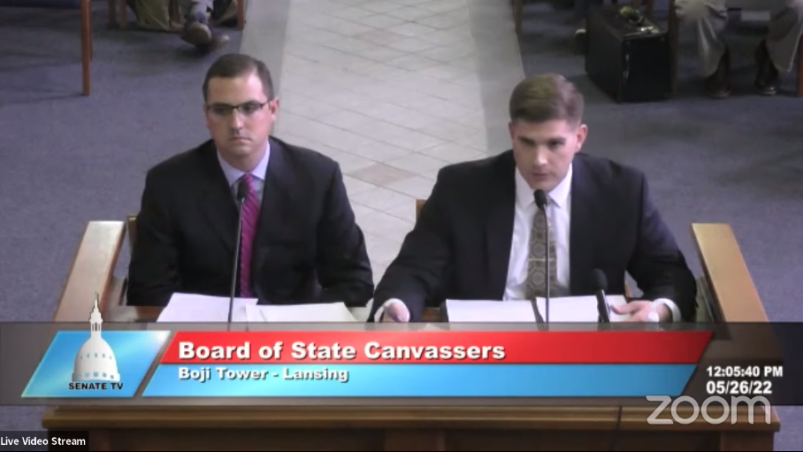The Michigan Republican gubernatorial candidates who the state found submitted thousands of fraudulent signatures will be kept off of the Aug. 2 primary ballot for now, after the state board that decides candidate qualifications split along party lines.
That includes the two frontrunners for the GOP’s nomination to run for governor, Perry Johnson and James Craig.
Several are expected to go to court to get their names on the ballot. The state’s elections director said Thursday that, in order for elections to run on time, ballots would need to be finalized by June 3.
The vote by the Michigan’s Board of State Canvassers — the same body that Donald Trump pressured to steal the election for him in 2020 — came after a parade of candidates and their lawyers cast themselves as victims of a ring of fraudulent signature-gatherers who took their money, but provided forged or otherwise invalid signatures in return.
Others took issue with the methods the state had used to declare those signatures fraudulent: Because campaigns collectively submitted nearly 70,000 invalid signatures, the state’s Bureau of Elections said Monday, it spot-checked signatures against state databases rather than confirming every single fraud.
On Thursday, state officials said they spot-checked roughly 10% of suspect signatures against the state’s qualified voter file, or around 7,000. Jonathan Brater, the state’s director of elections, did separately confirm that the Bureau “looked at every line” of the suspect petition sheets. The state Bureau of Elections said it identified 36 signature-gatherers who it thought were responsible for the fraudulent signatures; on these individuals’ petition sheets, the state said, it could not find a single valid signature.
But that wasn’t enough for some candidates, who protested on Thursday that it was the state’s responsibility to confirm every single signature they ruled invalid. They’ll likely take that same argument to court.
“I find this process to be an arbitrary goat rodeo,” said Donna Brandenburg, a Republican gubernatorial contender who at this point will not appear on the primary ballot. Brandenburg complained that she didn’t receive an early warning from the state that her own petitions showed signs of fraud.
“It’s a shame, it’s an assault against the American people on every single level,” Brandenburg said.
Michael Markey (pictured above, left), another now-excluded candidate for governor and one of several who’ve promised to sue, compared his situation to beachgoers heading toward shark-infested waters, saying the state hadn’t warned the candidates sufficiently about the risk of hiring ne’er-do-well signature gatherers. Then he switched metaphors.
“Does anyone contend that every home run that Jose Canseco hit was due to steroids?” he asked. “No.”
An attorney for Craig, George Lewis, said that if the state felt it did not have enough time to review every single signature it ruled invalid, it should have allowed the candidates onto the ballot despite the indicators of fraud.
“Doesn’t the law put the burden on the candidate to submit a sufficient number of valid signatures?” Mary Ellen Gurewitz, the Board’s Democratic vice chair, asked Lewis.
“Yes ma’am it does, and it also puts the burden on the circulators not to commit fraud,” Lewis responded. “We put forth that we are as much victims as anyone else here.”
Several challengers to the Republicans also spoke, arguing that the Board was well within its rights to throw out every signature from circulators who presented a consistent pattern of fraud — and for whom the Bureau of Elections staff said they could not find a single valid signature after thousands of checks.
“These circulators lied on the circulator certificates, allowing the board to disqualify entire sheets,” said Mark Brewer, the former chair of the state’s Democratic Party.
Other challengers noted that widespread fraud was plain to see: “We saw dead people on these petitions,” said John Allen, whose client challenged judicial candidate Tricia Dare. “We saw people who we knew were ill because they were neighbors of ours.”
Some paid petition circulators, Allen said, had even submitted “virtually identical” signature sheets for both Dare and Amanda Shelton, whose wife Kay Shelton challenged Dare’s signatures. “And we had gotten ours from them weeks earlier.”
Speaking a few minutes earlier, Dare’s attorney Eric Doster quoted a 2012 case in which the state’s then-elections director, Christopher Thomas, said the standard for spotting frauds was that forgeries should “slap you in the face.”
Later, Gurewitz said that was exactly how obvious the fake signatures were.
“It’s not the kind of forgery where a handwriting analyst is necessary,” she said. “In Mr. Doster’s words, it slaps you in the face.”







“Arbitrary goat rodeo” …. That it is, but not in the way you think, honey.
Oh. At first glance I thought we were talking about Michigan’s alternafraud electors and was happy seeing them declared ineligible for the 2024 election, but I guess this is about the midterms.
Hee-hee-hee-hee-hee-hee-hee-hee-hee-hee-hee-hee-HAW-HAW-HAW!
But I repeat myself.
Live by the convicted signature fraud collector, die by the convicted signature fraud collector.
It’s like Jaws out there in Michigan.